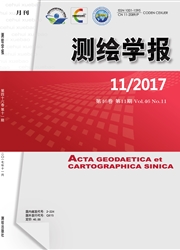

 中文摘要:
中文摘要:
由于GPS非差相位观测值的相位偏差(initial phasebases,{PB)与整周模糊度难以分离,精密单点定位(PPP)估值均为模糊度浮点解。首先对GPS原始观测方程的秩亏问题进行分析,从参数整合的角度,推导卫星IPB估计的满秩函数模型,形成一种新的PPP-AR算法。以此为基础,对已有两种算法的特点进行对比分析。研究表明,分解法是一种观测信息的最优利用,且与传统的星钟估计方法具有一致性,但未发掘卫星IPB较为稳定的有利约束;非整法对所采用的组合观测值之间的相关性未加考虑,是一种次优估计,实时性较差,且较依赖于高精度的码观测。推导的新算法可有效克服已有算法的不足,便于施加部分参数的合理时变性约束,提高卫星lPB估计的可靠性。
 英文摘要:
英文摘要:
Due to the inseparability between the initial phase biases (IPB) and the integer ambiguities in undifferenced (UD) GPS carrier phase observable, the solutions from precise point positioning (PPP) are always ambiguity-float. The rank-defect UDGPSobservationequation is firstly investigated, and the full-rank mathematical model for satellite IPB estimation is derived by means of re-parameterization, thus forming a new strategy for PPP- AR. Comparative analysis of the characteristics of both existing methods is subsequently conducted based on the derived re-parameterized equations. It is concluded from the analysis that full utilization of information from GPS observations is guaranteed in DSC method. The process of generating DSC is consistent with the standard satellite clocks estimation. However, the stable temporal behaviors of satellite IPB are net reasonably exploited. In contrast, the FPB method doesn't fully account for the mathematical correlations between the adopted linear combinations of GPS observations, which would result in a sub-optimal satellite IPB. Additionally, the real-time implementation of this method is more troublesome than the DSC, and the GPS code observations with high accuracy are always required. The newly presented strategy here can avoid the shortcomings in both current methods, and reasonable constraints that are converted from the temporal stability of several unknowns can be easily imposed upon the parameter estimation to lead to more reliable satellite IPB.
 同期刊论文项目
同期刊论文项目
 同项目期刊论文
同项目期刊论文
 Model analysis method (MAM) on the effect of the second-order ionospheric delay on GPS positioning s
Model analysis method (MAM) on the effect of the second-order ionospheric delay on GPS positioning s A new ionospheric tomographic algorithm - constrained multiplicative algebraic reconstruction techni
A new ionospheric tomographic algorithm - constrained multiplicative algebraic reconstruction techni Ionospheric Response to the Geomagnetic Storm on August 21, 2003 Over China Using GNSS-Based Tomogra
Ionospheric Response to the Geomagnetic Storm on August 21, 2003 Over China Using GNSS-Based Tomogra The ionospheric eclipse factor method (IEFM) and its application to determining the ionospheric dela
The ionospheric eclipse factor method (IEFM) and its application to determining the ionospheric dela An improved regularization method for estimating near real-time systematic errors suitable for mediu
An improved regularization method for estimating near real-time systematic errors suitable for mediu 期刊信息
期刊信息
